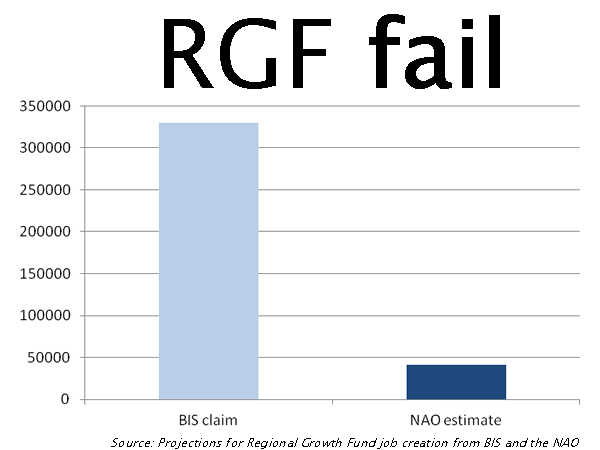Kevin Meagher at Left Foot Forward cogitates on the successes – or not, as the case may be – of the Regional Growth Fund. Launched in 2010 with £1.4 billions of funding, it was intended to kick-start economic development in down-at-heel regions of England and Wales.
Margaret Hodge, chairing the Westminster public accounts committee points to the paucity of active projects as “nothing short of scandalous”; and, if the reported figures of fewer than 2,500 new jobs created and just £60 millions of thus far allocated £470 millions being spent on front line projects is accurate, I would be inclined to agree.
The impression created is not as disreputable [yet] as that surrounding Close Protection UK. Here, after reinventing herself following a conviction for perverting the course of justice, Molly/Mary Price came into receipt of some £1 million of public funds to provide security on public contracts and training programmes for long-term unemployed and her personal transport on nights out.
It still leaves open the question of how much public money has been “parked in intermediate bodies” outwith the control of the Department of Business, despite the latter’s presumed decades-long experience of supervising such programmes.
The original projection of jobs created was some 330,000 over the seven year lifetime of the scheme. In May, Meagher referred to a National Audit Office report which suggested it could be as low 41,000 (see accompanying image). Scroll forward to this current report, allowing for an additional 2,700 projected jobs on top of the current 2,500, it looks as if the scheme is well on the low-way to achieving this.
Hodge and the Parliamentary report estimate that in a quarter of cases, each individual job would have cost in excess of £60,000 with some exceeding £200,000.
(The Scottish equivalent is the Regional Selective Assistance scheme as well as Training Plus grants. Although Amazon does appear to have created jobs by opening a new customer service centre at Waverley Place in Edinburgh, Kate Higgins at a Burdz Eye View poured scorn on their using public-funded schemes to finance an operation which, by all accounts, they already were committed to.)
In other news on similar schemes, Cait Reilly – whose objection to being required to participate in DWP training scheme at Poundland instead of her preferred local museum was discussed by SarahAB – recently lost her case. I have to admit, I am unclear if there were anything to stop her from doing both; and, if not, if there were a reasonable objection.
In stating his expectation to receive full payment for G4S’ lacklustre security provisions over the Olympics, CEO Nick Buckles has reminded the Parliamentary committee that his company run [our] prisons and hospitals.



